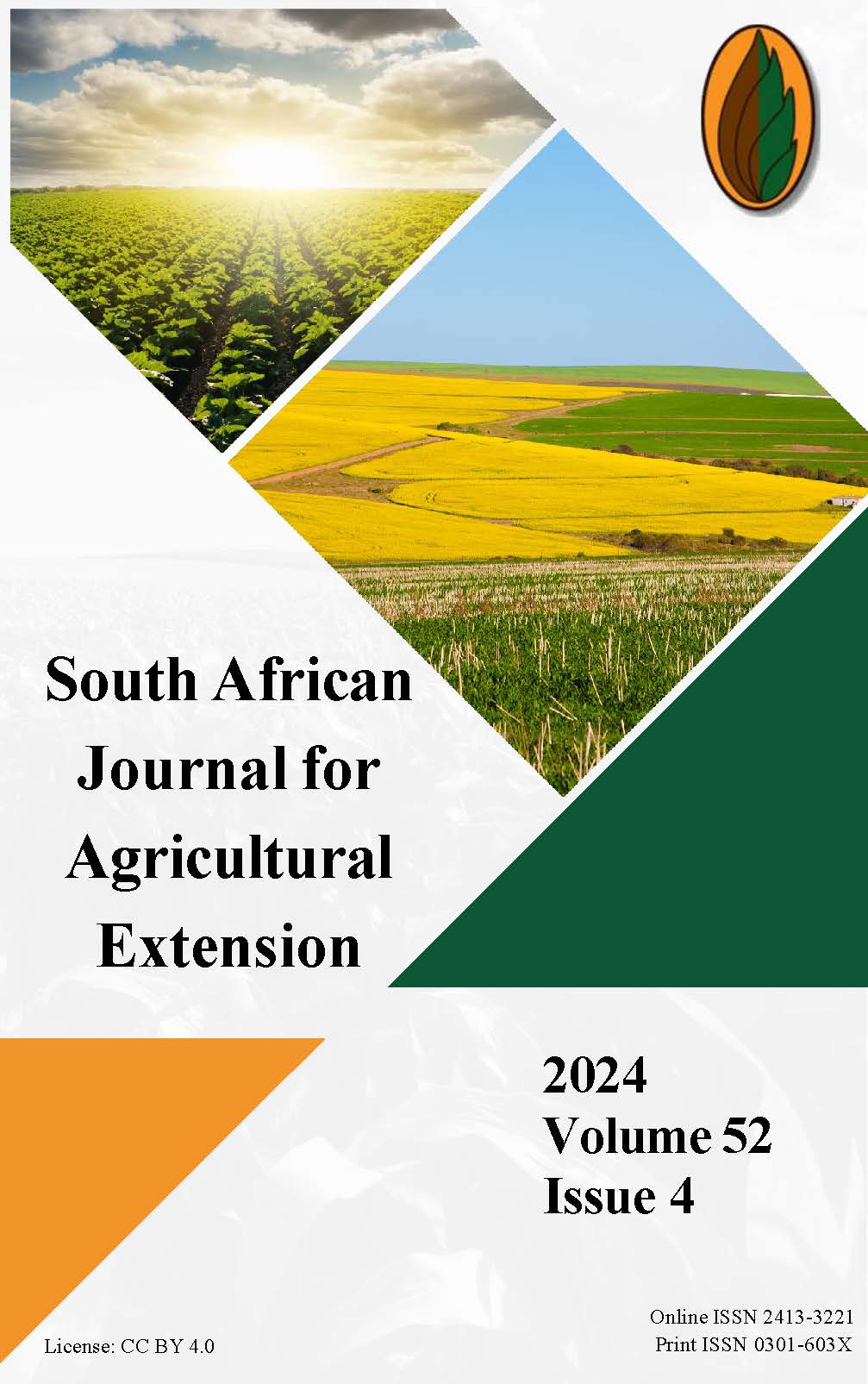Does the Adoption of Genetically Modified Seeds Improve the Technical Efficiency of Family-Owned Maize Farms? A Case of Alfred Nzo in the Eastern Cape
DOI:
https://doi.org/10.17159/2413-3221/2024/v52n4a18386Keywords:
Adoption, Technical Efficiency, Family-Owned Maize Farms, Genetically Modified SeedAbstract
This study mainly focused on measuring maize farmers' technical efficiency and impact on maize production in Eastern Cape province. This research has employed a formal survey conducted on a sample size of 164 farmers. Data was collected using a semi-structured questionnaire. Mean, standard deviation, frequencies and percentages were used for descriptive statistics to examine the socioeconomic characteristics of family-owned maize farms. The stochastic frontier model was also used to estimate the technical efficiency of family-owned maize farms under present conditions. The results have shown that the socioeconomic characteristics of farmers largely influence accessibility and awareness to these kinds of technologies. The adoption is delayed due to limited farmer support, lack of awareness, scepticism about these technologies within rural households, and poor perceptions and attitudes. Furthermore, the results have revealed that socio-demographic characteristics influence farmers' decisions on whether or not to adopt the technology. Most farmers are old and still believe in what works for them, which limits and elongates the adoption process. The empirical analysis shows that adopting genetically modified seeds enhances the productivity of family-owned farms. Furthermore, this study finds that the technical efficiency of adopters is higher compared to non-adopters. Therefore, this study recommends that strategic alliance is an important and necessary condition for farmers to adopt genetically modified technologies.
Downloads
References
ANANG, B.T., 2018. Farm technology adoption by smallholder farmers in Ghana. Rev. Agric. Applied. Econ., 21(1340-2018-5179): 41-47.
BENZ, B.F., 2001. Archaeological evidence of teosinte domestication from Guilá Naquitz, Oaxaca. Proc Natl Acad Sci., 98(4): 2104–2106.
CRESWELL, J.W., 1994. Research design: Qualitative & quantitative approaches. Sage Publications.
DOSS, C.R., MWANGI, W.M., VERKUIJL, H. & DE GROOTE, H., 2003. Adoption of maize and wheat technologies in eastern Africa: A synthesis of the findings of 22 case studies. CIMMYT Economics Working Paper 03-06. Mexico, D.F.: CIMMYT.
FADEYI, O.A., ARIYAWARDANA, A. & AZIZ, A.A., 2022. Factors influencing technology adoption among smallholder farmers: A systematic review in Africa. J. Agric. Rural Dev. Trop. Subtrop., 123(1): 13-30.
HU, X., & ZHONG, F., 2012. Rural population aging impact on food production—analysis of rural fixed observation point data. Chinese Rural Economy., 2012: 47-55.
KENNY, D., KASHY, D. & BOLGER, N., 1998. Data analysis in social psychology. In D.T. Gilbert, S.T. Fiske, & G. Lindzey (eds.), The Handbook of Social Psychology (4th edn), pp. 233–265. New York: McGraw-Hill.
LI, M. & ZHAO, L., 2009. Agricultural labor 'aging' phenomenon and its impact on agricultural production—based on empirical analysis of Liaoning Province. Issues Agric. Econ., 10: 12-18.
MABAYA, E., FULTON, J., SIMIYU-WAFUKHO, S. & NANG'AYO, F., 2015. Factors influencing adoption of genetically modified crops in Africa. Dev. South. Afr., 32(5): 577-591.
MWANGI, M. & KARIUKI, S., 2015. Factors determining adoption of new agricultural technology by smallholder farmers in developing countries. J. Econ. Sustain. Dev., 6(5).
RAMBE, P. & KHAOLA, P., 2021. The impact of innovation on agribusiness competitiveness: the mediating role of technology transfer and productivity. Eur. J. Innov. Manag., 25(3): 741-773.
SABIR, H.M., TAHIR, S.H., ARSHAD, S. AND NASIR, S.B., 2012. Future of cooperative farming in Pakistan. J. Biol. Agric. Healthcare., 2(6): 42-48.
SINGH, B., 2014. Technology based entrepreneurship in agriculture-role of agribusiness incubators. Int. J. Manag. Int. Busi. Stud., 4(3): 249-254.
SNYDER, H., 2019. Literature review as a research methodology: An overview and guidelines. J. Bus. Res., 104: 333-339.
TARUS, C.B.K., 2019. Maize crisis: A position paper on strategies for addressing challenges facing maize farming in Kenya. East African Scholars J Edu Humanit Lit., 2(3): 149-158.
TASHAKKORI, A. & TEDDLIE, C., 2021. Sage handbook of mixed methods in social & behavioural research. SAGE publications.
WOSSEN, T., ABDOULAYE, T., ALENE, A., HAILE, M.G., FELEKE, S., OLANREWAJU, A. & MANYONG, V., 2017. Impacts of extension access and cooperative membership on technology adoption and household welfare. J. Rural Stud., 54: 223-233.
YOKAMO, S., 2020. Adoption of improved agricultural technologies in developing countries: Literature review. Int. J. Food Sci. Agric., 4(2): 183-190.
ZANU, H., ANTWIWAA, A. & AGYEMANG, C., 2012. Factors influencing technology adoption among pig farmers in Ashanti region of Ghana. J. Agric. Technol., 8(1): 81-92.
Downloads
Published
Issue
Section
License
Copyright (c) 2024 K. Gcaba , M. Christian, L. Usapfa

This work is licensed under a Creative Commons Attribution 4.0 International License.








.png)